Hi Everyone!! This article will share Television Poem Questions & Answers.
This poem is written by Roald Dahl. In my previous posts, I have shared the questions and answers of The Old Man at the Bridge, After Blenheim and An Angel in Disguise so, you can check these posts as well.
Television Poem Questions & Answers
Question 1: Read the lines and answer the questions:
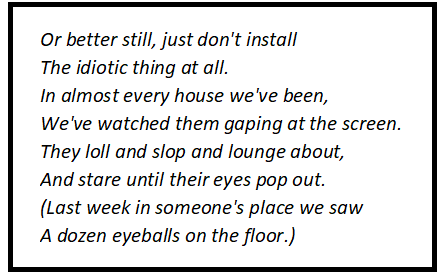
(a) What is referred to as the ‘idiotic thing’? Why?
Answer: Television is referred to as the idiotic thing as it destroys all thinking abilities of the children as they are glued to watching television. They are fascinated and intoxicated by the meaningless entertainment that is churned out on television.
(b) Who keeps on ‘gaping at the screen’? Why?
Answer: The children keep on gaping at the screen as they get hooked/addicted to whatever is shown on the television.
(c) What does the poet mean by ‘their eyes pop out’?
Answer: By ‘their eyes pop out’, the poet means that the children are so glued to the television watching it, so that they cannot concentrate on anything other than what they are watching.
(d) Comment on the last two lines of the quoted passage.
Answer: The last two lines of the quoted passage is an exaggeration. The poet does so to make people aware of how children become so engrossed in watching television that they merely stare at the T.V screen without doing any productive work.
(e) Do you agree with the poet? Give reasons to your answer.
Answer: Yes, I agree with the poet that television is detrimental to children’s mental and physical health as the more children watch television, the more they lose their power of thinking. They just merely watch shows on television without applying their minds, so no mental development happens and moreover, they become couch potatoes.
Question 2: Read the lines and answer the questions:
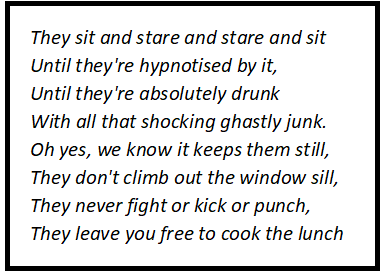
(a) Who are ‘they’ in the passage? What is being told about them?
Answer: ‘They’ are children in the given passage. The poet, Roald Dahl, states in the poem that children are hypnotized by television viewing and it has bad repercussions (bad effects) in their mental and physical growth.
(b) What is ‘ghastly junk’ referring to? Do you agree with the reference?
Answer: The poet refers to television programmes as ‘ghastly junk’. Yes, most of the television programmes that are aired are nothing but ‘ghastly junk’. Ghastly junk means horrible and useless matter.
Television Poem Questions & Answers
(c) What keeps them ‘still’? Why?
Answer: Ghastly television programmes make children sit in front of the television for long in ‘still’ motion. They remain ‘still’ as they are hypnotized by the television programmes.
(d) Who are left free to ‘cook the lunch’? What do they do to ‘cook the lunch’?
Answer: The parents are left free to ‘cook the lunch’. To ‘cook the lunch’ the parents switch on the television sets so that their children would sit still in front of the television screen and they would not do weird things like climbing the window sill, jumping over it, fighting, throwing tantrums etc.
(e) Do you think they are justified in doing such things to ‘cook the lunch’?
Answer: No, they are not justified in doing such things as switching on the television as television programmes have made the children grow up without any mental alertness or intellectual stimulation or physical exercise. Parents, instead of making their children watch television should provide their kids with storybooks. When children will develop the habit of reading books, they will not feel like watching television. They will enjoy reading books as it will sharpen their minds with imagination.
Question 3: Read the lines and answer the questions:
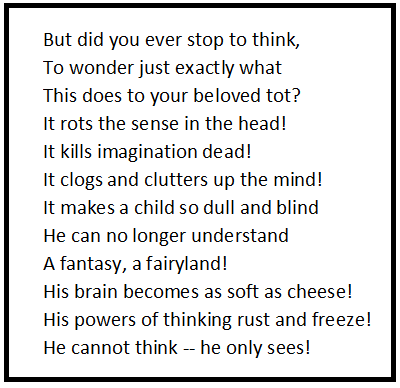
(a) What is the poet asking us to ‘wonder’ in the second line of the passage? Who is the ‘beloved’ in the third line of the passage?
Answer: The poet is asking the parents to wonder about the effects of television viewing on children. He points out the bad effects of watching television because it can destroy their imagination. The children are the beloved in the third line of the stanza.
(b) Why does the poet use the capital letters in certain sections of the passage? Does it have any significance in the poem?
Answer: The poet uses Capital Letters in certain sections of the passage as he wants to emphasize the ill-effects of television watching. Yes, it has significance, as they carry the main message of the poem. And the message is that watching too much television fills up the mind of children with useless facts. It destroys their ability to create or understand the worlds of fantasy in their imagination.
(c) What is the effect of ‘it’ in the passage on the children? Comment on the effects in your own words.
Answer: The effects of ‘it’ (the television) on the children are such that they lose their power to think and imagine. Their minds get cluttered with ‘ghastly junk’ and their brain becomes ‘soft as cheese’. In the process, children cannot think anymore, but they merely watch television programmes.
(d) What does the poet mean by ‘a fantasy, a fairyland’? What importance do they have in a child’s development?
Answer: By ‘a fantasy, a fairyland’ the poet refers to the fantastic stories that are written for children. Fantasy or fantastical stories really have significant importance in a child’s development as they enhance their power of imagination and make them innovate (creative thinking skills).
Television Poem Questions & Answers
(e) What comparison does the poet make between brain and cheese? What does the comparison refer to?
Answer: The poet states that the children who watch television excessively, their brain becomes soft as cheese. Through this comparison, the poet tells the readers how the children who excessively watch television become creatures who do not have much-thinking abilities.
(f) What does the poet mean by ‘he only sees’ in the last line of the passage?
Answer: By ‘he only sees’, the poet means that children who excessively watch television only ‘sees’ the television programmes and lose their ability to think and imagine.
Question 4: Read the lines and answer the questions:
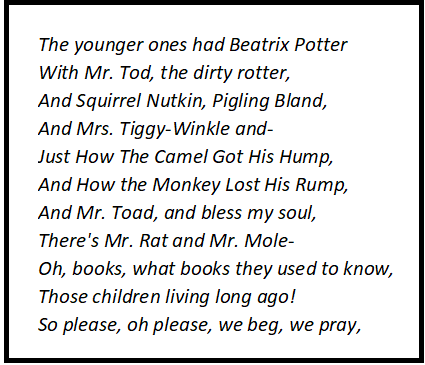
(a) Who are the ‘younger ones’ referred to in the first line of the quoted passage?
Ans: The ‘younger ones’ are young children who used to read the animals fables of Beatrix Potter.
(b) Who are the following – Beatrix Potter, Mr. Tod, Squirrel Nutkin, Pigling Bland, Mrs. Tiggy Winkle.
Answer: Beatrix Potter is the author of many Children Books which are primarily animal fables and Mr. Tod, Squirrel Nutkin, Pigling Bland, Mrs. Tiggy Winkle are characters from her books.
(c) Which children are referred to in the second last line of the quoted passage who were ‘living long ago’?
Answer: The children referred to in the second last line of the passage are the children living before television was invented, who used to read a lot of books and more books were waiting for them to be read.
(d) What does the poet beg and pray? Why does he do so?
Answer: The poet begs and prays that the television sets should be taken away from the children and they should be introduced to reading more and more books. This will awaken their senses and it will give them enough opportunity to imagine and visualise a scene explained in the storybooks.
(e) Is the poet justified in begging in such a manner?
Answer: The poet is justified in begging in such a manner because parents usually find television to be an easier option to keep children ‘still’. What they fail to understand is that Television will mar (spoil/damage) their children’s mental and physical health and kill their imagination, whereas books will lead to the development of a healthy mind in them. Therefore, parents should inculcate the habit of reading books to their children.
Television Poem Questions & Answers
Question 5: Read the lines and answer the questions:
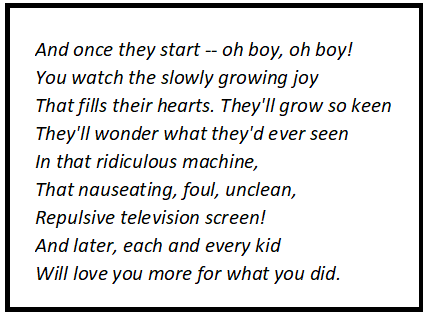
(a) Who are ‘they’ in the first line? What would they ‘start’ doing?
Answer: ‘They’ are the children in the first line of the passage. They should start reading more and more rather than being glued to the ghastly television programmes.
(b) What does the poet mean by ‘slowly growing joy’? What joy is the poet referring to? How can the joy refer to in the passage be achieved?
Answer: The reading of books will bring ‘slowly growing joy’ for the children. The joy of reading a book is being referred to. The joy can be achieved if television sets are removed from houses and books and more books are introduced to the little children.
(c) What is the ‘ridiculous machine’? What does the poet want us to do with the ‘ridiculous machine’?
Answer: Television set is referred to as a ‘ridiculous machine’. The poet wants television set to be thrown out of the houses so that they can no more corrupt the minds of the younger ones.
(d) Enumerate the initial reactions of children if one acts according to the poet’s suggestions?
Answer: The initial reaction of children if television sets are taken out of the houses would be screaming and yelling. They can even bite and kick and go to the extent of hitting with a stick.
(e) Why is television referred to as ‘repulsive’ and ‘nauseating’?
Answer: ‘Television’ is referred to as ‘repulsive’ and ‘nauseating’ as it rots the mind of children to such an extent that they cannot think anymore and their imaginative powers are lost.
(f) What is done to the children for which they will love more? Do you think the poet is justified in his suggestion?
Answer: Children will love their parents more if they are given more and more books to read. Yes, the poet is justified in his suggestion as books will make the children unearth lots and lots of treasures that are hidden in the books.
So, these were Television Poem Questions & Answers.